#JJK Spoiler
Text
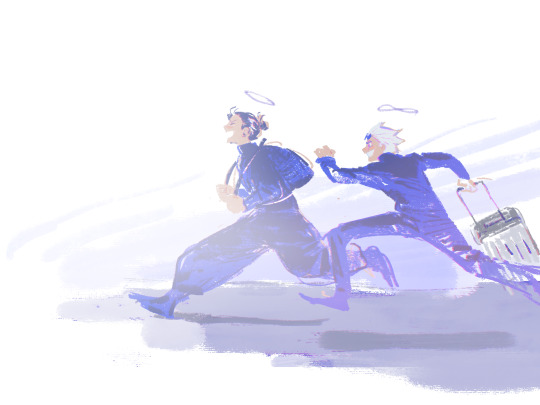
They’re okay just going on a vacation! ! ! 😇
#jjk#baegl's art#jujutsu kaisen#gojo satoru#geto suguru#jjk spoilers#Jjk spoiler#don’t mind me#coping#lol
1K notes
·
View notes
Text
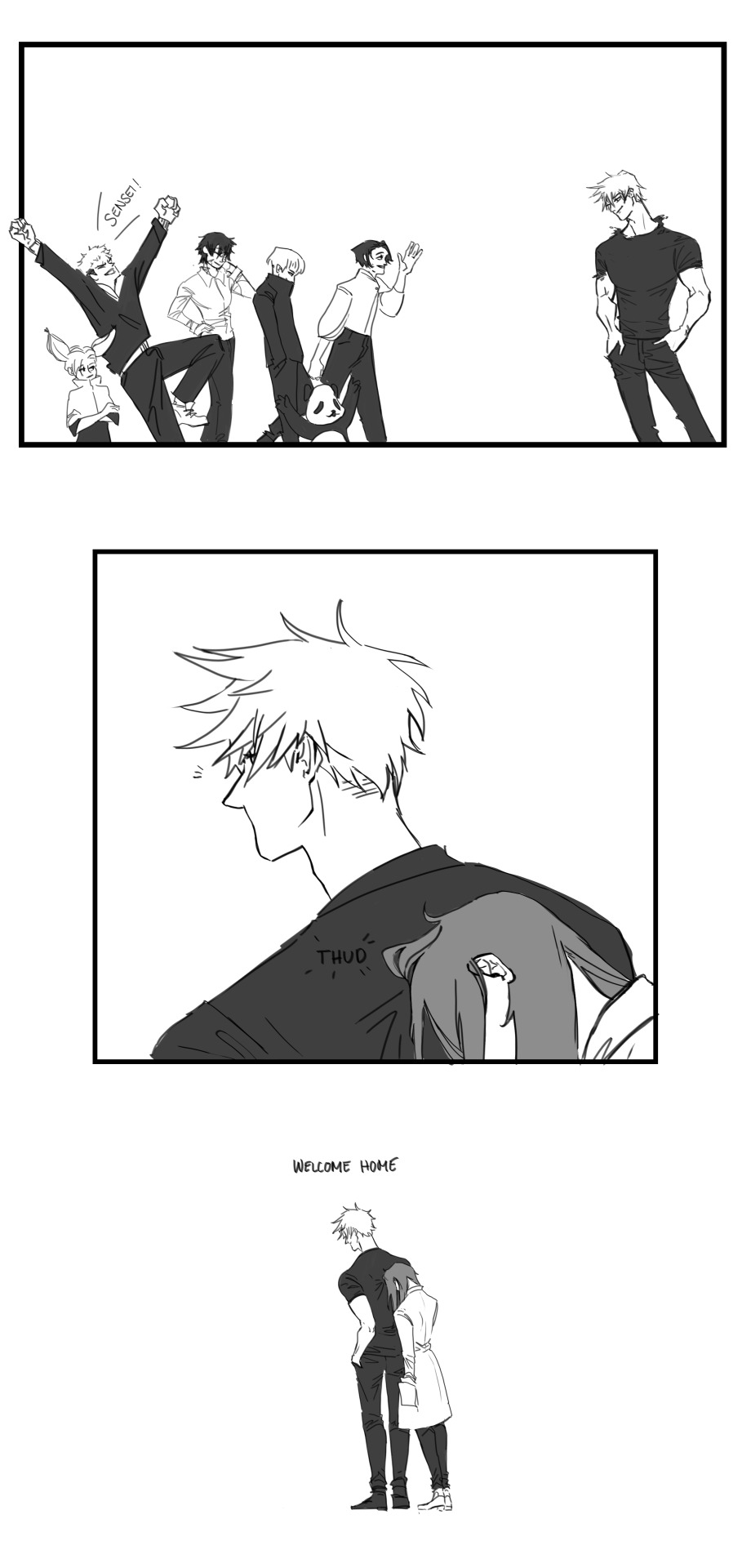
#i know it's not gonna happen like this but listen#let me dream#anyway#he's back#he's home#he's not alone#also#holy hell he's jacked... but i love drawing that ehehehehe#jjk#jujutsu kaisen#fanart#spoiler#jjk spoiler#jjk 221#gojo satoru#shoko ieiri#she missed him!!!!!#IPMSSA_SatoSho!Fanart#IPMSSA_Panels#IPMSSA_canon!Fixit
8K notes
·
View notes
Text
i feel like this episode really drove home just how alone young gojo and geto were. it's been a running theme in the series for a while that sorcerers are often left to fend for themselves from pretty early on in their careers, and miwa even mentions at one point that people tend to keep others at a distance just because of how dangerous their work is and it's not worth grieving someone every other day. but even in a school setting, it's so obvious that the teachers and other adults solely exist to deliver instruction and delegate missions - no advice, no emotional support, no real guidance despite how draining their lifestyle can be and how young the students are. gojo, geto, riko, and kuroi show up at jujutsu high after 3 days of constantly being on guard and no one is waiting for them. during the mission there was no sign of yaga or anyone else checking in on how they were doing or if they needed any extra support (sending 2 of their underclassmen does not count). and i know to a certain extent the hands off approach is because they trust in gojo and geto's abilities but the amount of responsibility they were burdening literal children with is kind of insane. minor spoilers but geto's character development from here on out should not come as a surprise to anyone. especially with future scenes that we will be seeing animated (such as a certain one in the morgue), i hope this season will make it clear that adult gojo being protective of his students and willing to defy the higher ups is more than him just being cocky and "the strongest." jujutsu society and the system as a whole consistently failed him and his friends. he became the strongest because he had to be.
#if there is one thing gege has done right.#it's the depiction of youth in jujutsu society#the exploitation and the trauma and the heartbreak#'it is not a sin to be a child' did not just come from nowhere!#jujutsu kaisen#jjk#jujutsu kaisen spoilers#jjk spoiler#gojo satoru#geto suguru#amanai riko#jjk season 2#jujutsu kaisen season 2
2K notes
·
View notes
Text


never ask a writer
422 notes
·
View notes
Text

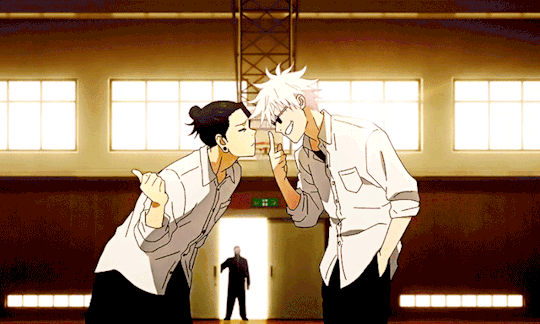

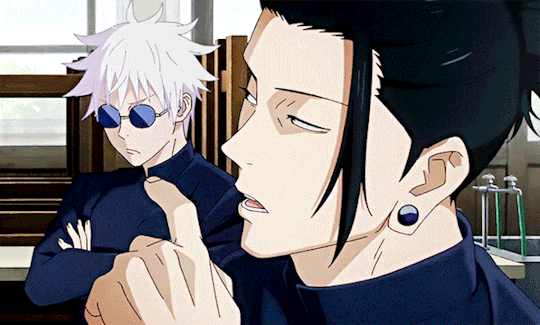
Gojo Satoru and Geto Suguru in Jujutsu Kaisen Season 2 Episode 1
#Geto Suguru#Gojo Satoru#Satosugu#Geto#Gojo#Jujutsu Kaisen#Jjk#Jjk season 2#Jjk season 2 spoilers#Jjk spoiler#Jujutsu Kaisen Spoiler#Jujutsu Kaisen season 2 spoiler
2K notes
·
View notes
Text
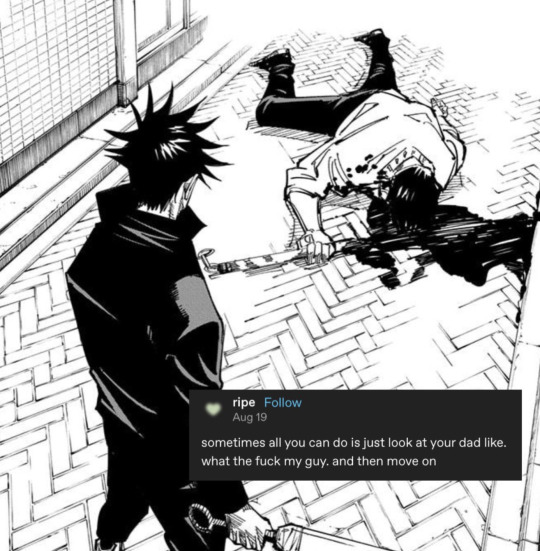
#omg toji-core! *kills self*#up1k#cattoru's#jujutsu kaisen spoiler#jujutsu kaisen manga spoilers#jujutsu kaisen spoilers#jjk manga spoilers#jjk manga spoiler#jjk spoilers#jjk spoiler#jjk.memes#memes.mine#jjk#toji#megumi
3K notes
·
View notes
Text
Why i believe Gojo could come back
This chapter left us in a devastated state and was absolutely uncalled for, but I personally believe this isnt the end of the strongest sorcerer. There are several reasons as to why (These are just opinions, I could be wrong in certain areas AND personal feelings might make an occassional appearance.)
LEAKS:

This whole panel was obviously made for a reason. And we dont see gojo making a decision. Considering the fact that this is literally THE Gojo Satoru, he's more likely to choose north since there's numerous things left as plot holes. We'll get to that.
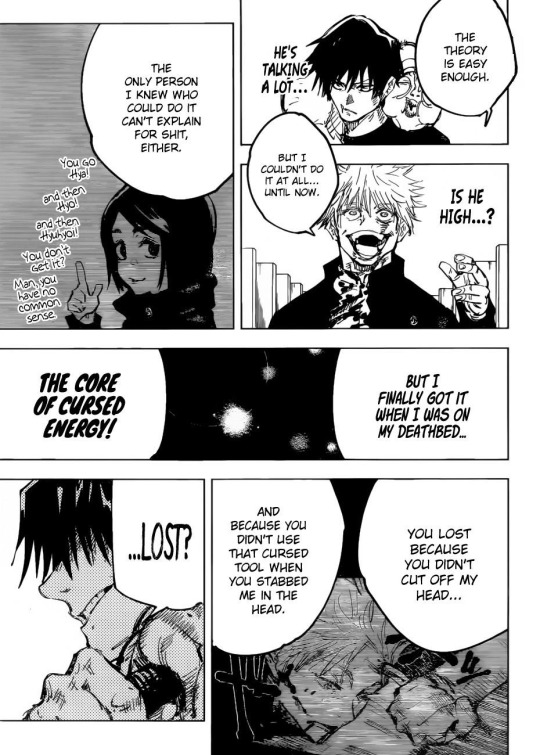
Here in this page, he mentions that Toji should've cut his head off to actually kill him. In the leaks, whats cut off is his upper body but not the head! I still can't quite wrap my head around RCT but lets say he's not able to heal himself. You know who can and who would? Yuta and Shoko


Now moving on

"Gojo then bids farewell to everyone." If hes truly gone then why would he be bidding farewell to the fallen comrades? If he's dead then isn't he supposed to stay in the afterlife with them?

Pretty self explanatory
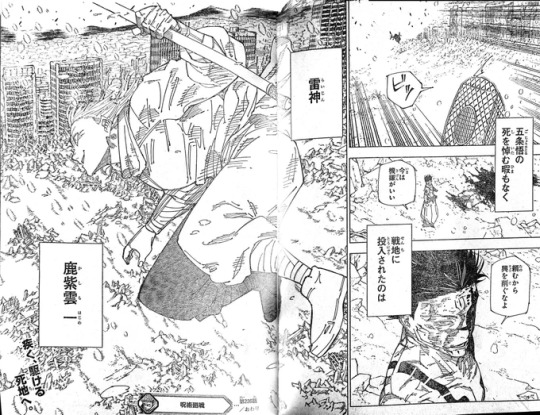
What if Kashimo is going in to distract Sukuna while Shoko and Yuta can heal Gojo?
Now think about this. Gojo is gone, Shoko doesnt fight and who are all left? A bunch of sorcerers who are literally under 20, need guidance and we havent really seen any panel where they actually plan how they're going to go about in the whole battle. Gojo isnt a want, hes a NEED, a NECESSITY.
Remember, Toji who was dead long ago pretty much appeared out of nowhere in Shibuya Arc LMAO so- yes

WHAT IS THIS EVEN SUPPOSED TO MEAN
Theres no way Gojo would be left sealed for 3 whole years, brought him back just to kill him off in the most disrespectful way possible.
Besides, things that Gojo wanted to do haven't happened yet.
He wanted to tell megumi about his father
He wanted to see his students surpass the strongest sorcerer, aka him
He wanted to get rid of the higher ups
He wanted to properly mourn suguru (for which kenjaku has to be defeated but oh well)
He wanted to save Megumi
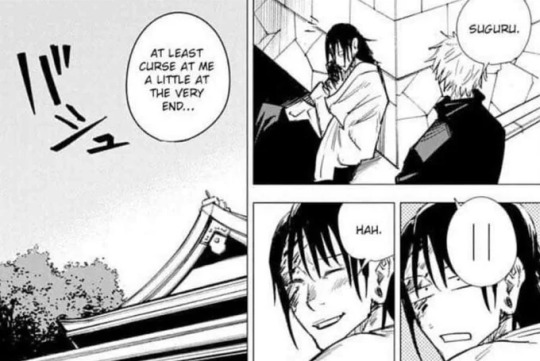
How'd we know what Gojo said here.
On to the other aspects of why killing off Gojo was a bad idea. We barely ever saw what happened to him, and an off screen death to the so called strongest sorcerer is just senseless. Gojo is a fan favourite. People started watching the show for Gojo (myself included) and there's a high possibility of multiple people dropping the manga since he isn't even there anymore.
The ending could take a turn for the worse considering the fact that Sukuna is just overpowered and Kenjaku hasn't done anything as of now. Unless there's some heavy plot armor I dont think the students even stand a chance against Sukuna and Kenjaku. Both outcomes- the students and others emerging as victors or sukuna emerging as a victor could make the ending absolutely terrible and this might as well top AOT for being the manga with the most disliked ending.
Gojo Satoru is the mentor for multiple; for Yuji, Nobara, Megumi, Yuta, Maki, Panda, Toge and the third years and its necessary for them to have someone to teach them. It is one of Satoru's wishes to see his students surpass him, which can happen only when he's there since there's nobody else who is actually capable of teaching them and leading them into the world as actual graduated sorcerers.
So Gojo dying will make the manga take a turn for the worse. Killing him off in the middle makes absolutely no sense and is just plain bad writing. People are prolly gonna kill me for this but lets admit the truth. Hyping this battle, building up tension just to finish him off screen is NOT good writing.
Anyways. There is factual proof of Gojo potentially making a return. Maybe at a cost, like him losing his power, losing his "strongest" title or anything else. He may not even be the same anymore but honestly as long as he's back, I'm fine.

It happened previously, and could happen again.
Satoru Gojo may not be the strongest and the honoured one, but may be reborn as a newer version of himself after getting humbled. Lotuses, as mentioned above symbolise rebirth, which is why i believe this is not the end.
A small bit of advice for gojo fans: Go watch haikyuu or highschool babysitters as a form of self care <3
#jjk#jujutsu kaisen#jjk236#gojo#gojo satoru#jjk gojo#jjk theory#jjk spoiler#jujutsu kaisen spoilers#sukuna#jjk sukuna#yuji itadori#satoru gojo#jjk leaks#jujutsu kaisen leaks#dont worry yall hes not dead#gojo will win#jjk manga#jjk headcanons#gojo x reader#jjk megumi#megumi fushiguro#toji fushiguro#jjk toji#jjk gojo satoru#jujutsu gojo#geto suguru#kenjaku#yuta okkotsu#shoko ieiri
1K notes
·
View notes
Text
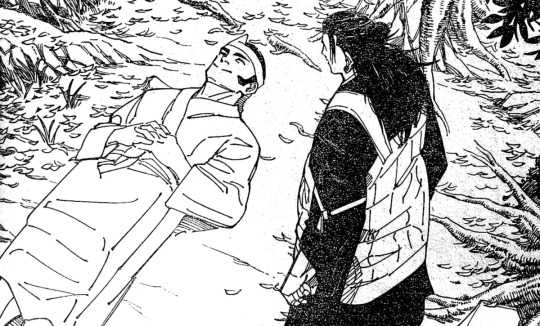
The Death of Kenjaku
So I was planning to write this meta the week that Kenjaku died, but decided to delay until we got full confirmation of his death. Something I didn't believe in even after Kenjaku passed the merger onto Sukuna. However, watching this video about death in Jujutsu Kaisen inspired me to finish this post. Not because I disagree with anything the YouTuber is saying, but because they can speculate on the meaning of so many deaths in Jujutsu Kaisen but can't find the meaning in Kenjaku's sudden death.
This has led me to speculate why Gege made the choice to kill Kenjaku in the way that he did. What meaning is there in Kenjaku's abrupt and unsatisfying death?
Who is Kenjaku?
The first step in understanding Kenjaku's death is of course understanding how he lived. We actually know incredibly little about Kenjaku's character by design. Despite the fact he's literally in Geto's body, he's not meant to have sympathetic or human motivations to his actions (though hold onto that "human motivation" in your head for a moment). No flashback sequence shows the audience why this guy is the way he is, no single event seems to have driven him to do what he did.
This is what we know about Kenjaku in brief. He is a sorcerer who is over a thousand years old who was around in Sukuna's day. He once had a friendship with Tengen, but found her original self boring and unambitious. He also contrasts heavily with Tengen, who lives outside of humanity, because he has lived among humanity for 1,000 years. One of those lifetimes was Noritoshi Kamo who violated a woman and conducted heinous experiments. He produced ten children in his one thousand years, the nine death painting siblings and Yuji Itadori. He considers the first children boring, because human and curse hybrids turned out too normal.
He also partially blames himself for how boring they are, because he can't create anything that will exceed his expectations, the only thing that can exceed his expectations is born in chaos. He spent a thousand years organizing the culling games, and wants to use the games to create a merger, because he thinks creating a merger between Tengen and Humanity will create something entirely new and interesting. He also believes the way towards the future lies in further optimizing cursed energy, not in breaking away from it the way Yuki Tsukumo tried to do and Maki has.
The only people whose word we have on Kenjaku's motivations are Kenjaku himself, and Tengen's word and Tengen themselves who claims to not know what goes on in the human heart.

From all of the above Kenjaku seems to be a shallow character who's motivations can be summed up as "because I can" and "I want to see what happens." This shallowness is intentional however, as Gege who once praised the minimalist storytelling of Nasu and Evangelion likes to pick and choose what crumbs of backstory he gives out for his characters. We've never gotten any exposition on the Gojo clan, but we have an entire chapter about Takaba's failed career as a stand-up comic. This isn't a judgement of good or bad writing, this is just how Gege writes as minimalist as possible. This is in line with how Gege writes the ancient sorcerers as well, they are all much more shallow driven by instinct or Freudian Id (I desire) rather than the higher reasoning of modern-day sorcerers. Takaba uses comedy as a means of communication and bridging the gaps between people, Higuruma's backstory is the critique of the modern day justice system.
Ishigori apparently lived a satisfying life where he was succesful and had good women, but that wasn't enough so he wants to get into a fight with Yuta to satisfy his hunger and feel like he's eaten desert.
It sounds shallow when I summarize it in text, but in the context of the fight with Yuta, it's a challenge for Yuta who for the most part only cares about his loved ones and sees the world through his love goggles to be more selfish and fight for his own desires. It's also reflective of a more basic and instinctual kind of thinking, as opposed to the higher reasoning and logic that modern-day sorcerers apply.
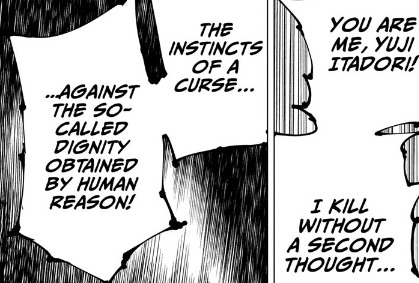
I'm keeping most of this first part to text for this reason, like go back and read the fight with Ishigori and Yuta. If I summarize Ishigori's character reasoning out of context it sounds stupid, but read the fight and it works because it's ID (I Desire) vs. Yuta's superego in not only having to collect points to help rescue Tsumiki, find a way to protect all the innocent people in the Culling Games, and also collect enough points to take on Kenjaku himself so Gojo won't have to. Meanwhile Ishigori's just fighting to get some of that sweet desert, the shallow works in contrast to the more layered motivations of our heroes.
Kenjaku is a shallow archetype fighting to satisfy his baser impulses (in his case curiosity) in comparison to the main characters who are fighting for more complicated reasons and often people besides themselves.
The question then becomes what archetype is Kenjaku. In that case answering who Kenjaku is is quite simple.
Kenjaku is a clown.
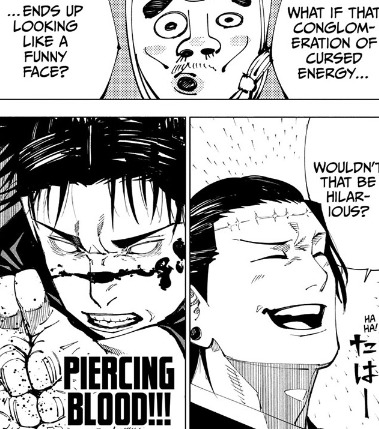
It might be more accurate to say that Kenjaku embodies what's commonly known as the "trickster archetype" but I'mma go with clown.
The most obvious example of a clown villain is what most consider the joker to be, that is a silly little clown man who challenges the straight faced and grim batman and sews chaos where Batman attempts to establish law and order in Gotham and make the city into a better place.
From the book Batman and Psychology:
More than any other villains, the Joker and Two-face reflect Batman himself as funhouse distortions, converses of who and what he is. The laughing, jesting, brightly colored Joker contrasts with grim, dark Batman. The Joker is the Joker. No alter ego. The film's opening bank robbery shows him wearing a clown mask over clown makeup, Under the surface there's only more Joker. He gives no history except inconsistent lies. When he finally considers the impact of his demand Batman unmask, he retracts the threat and demands that Batman's identity remain undisclosed. He wants a batman who has no other self, a Dark Knight whose only deeper layer is further darkness.
Is there a better descriptor for Kenjaku then these words?
Kenjaku is Kenjaku. No alter ego. A clown mask over clown makeup., Under the surface there's only more Kenjaku.
In other words, what you see is what you get.
Kenjaku even mirrors Joker's opinion of Batman, he thinks people should be more like him, not the other way around. He's not the outlier, he's being true to humanity's basic impulses of curiousity and discovery.


A more apt comparison as a clown though would probably be Loki, one of the most classic examples of clowning in the shared mythology of humanity. The character who challenges the common wisdom of gods like Odin who suspended themselves from the world tree for eleven days in order to gain wisdom. Loki, who through his trickery manages to bring about the events of Ragnarok for no deeper reason than because he can. Everyone swore not to harm Balder and Loki goes to find something that can harm him because BET.
Mythological Loki doesn't need a deeper motivation because what he represents in the mythology is someone who challenges authority and brings about a change, because in Norse Mythology nothing lasts forever and no era is permanent. Jujutsu Kaisen is also a story about how things should not in fact stay the same and tradition is bad sometimes.

When Kenjaku finds Tengen's true body he's curled up in a tree root in the fetal position, and he killed what is basically the all-knowing, all-seeing supposedly immortal sorcerer that maintains the status quo of japan, it's not exactly subtle.
Kenjaku is a clown, and clown's gotta clown. We don't need any more explanation that, it's more about what he does for the story. However, what he represents, the deep intellectual curiosity, and also a drive to disrupt the status quo in an attempt to see something more interesting can also be analyzed more deeply because they are human emotions that motivate us as well. The same way that Mahito is an inhuman monster, but he's created and motivated by the fear of other humans, something all of us have. '
Before moving onto his death though, I wanna hammer in how Kenjaku really is just motivated by these two things, a desire to see something interesting, and intellectual curiosity by comparing him to other characters.
The Clown in Fiction
I've already compared Kenjaku to Loki and the Joker, but when it comes to someone who wants to disrupt the entire order of the world simply because they're bored we've got to go to the original girlboss.

So there are plenty of villains who go "I'm evil because I'm bored" but they usually tend to be pretty shallow, either shallowly written for the lulz evil characters who just exist for shock value or just kinda dull. No one has ever done it as good as Junko Enoshima and no one ever will again.
For those who need context DanganRonpa is a death game series where the main villain basically has caused the apocalypse, wiped out most of humanity, and then induces survivors in a bunker to kill each other in a death game, where if someone commits a succesful murder they can escape the bunker, but if they're caught in a trial they're executed. Also, if they're not convicted in the trial everyone else is killed, motivating the jury to find and execute the guilty murderer.
Junko Enoshima the main villain and orchestrator of this death game ended the world because despair. She wants to inflict despair on everyone because despair. Because hope sucks and despair is where it's at.
It sounds shallow and it is and Kodaka has said in interview he wrote Junko to be a villain character with zero redeeming character traits, and no sympathetic backstory to describe why she is the way she is, but there is still something motivating her.
If you go a bit deeper into the lore and read Dangan Ronpa Zero, there is an entire book which explains the lengths which Junko goes to feel normal human emotions. The thing is much like Kenjaku Junko is too smart for her own good, everything is predictable and therefore everything bores her. Once in an attempt to live normally, she literally lobotomizes herself, makes it so that she can't remember anything and has continual amnesia constantly forgetting what just happened to her, because that's the only way she can live without knowing everything that's going to happen and constantly predicting everyone's actions.
Junko has whatever her universe's version of the six-eyes is, but instead of lording it over other people like Gojo and basking in her superiority she wants to feel normal, and connected to the world. If she can't have that she tries to make the world as unpredictable place as possible so she can experience it the same way that everyone else does.
Hope is harmony. A just heart, moving toward the light. That is all. Despair is hope's polar opposite. It is messy and confusing. It swallows up love, hatred, and everything else. Because not knowing where you will end up is despair. Despair is even what you cannot predict. Only despair's unpredictability can save you from a boring future.
I'm still not describing it properly because I don't want to go into a Danganronpa essay in this post about Jujutsu Kaisen, but one example I always use is two characters from American Dragon Jake Long. They're a pair of twins who see the future, one always sees happy things, and one always sees sad things. The one who has happy visions is a goth who's very depressed and the one who sees disaster is an incredibly peppy girl.
Jake is so confused as to why the twin who always sees good visions is so depressed, and she basically tells him to imagine having every good thing, every small little surprise, every pleasure taken out of life.
Kara: When you only see good things, nothing's special anymore. All the pleasant surprises are taken out of life.
Sara: But, when you only see bad stuff, even the smallest bit of good news makes you happy!
All of this to say what Junko feels isn't just boredom, or a desire to commit evil for evil's sake, but also a full on existential crisis where she's simply too smart so she doesn't feel any connection to other people or the world around her. In order to feel that connection, that connection that everyone else has, to feel like she is actually a participant in her life not an observer she's willing to go to extremes to make the world a more interesting place, to therefore make her own life feel satisfying.
Kenjaku vs. The World (Kenjaku Pilgrim's sad little life)
To connect all this back to Kenjaku imagine the profound existential despair of a person who's lived for a thousand years, and felt bored all that time. Sukuna is at least a hedonist, he gets his fun by getting into fights, humans might be bugs to him but they're tasty bugs.
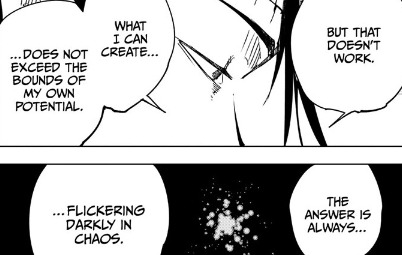
Kenjaku goes to similiar motivations and has similiar extremes, he's uninvested in the world around him, he's lived a thousand years but has no attachment to the world, to life, to the people around him. I said that Junko wants to be a participant in life not an all seeing observer and that was purposeful language because to bring back an old post. I rambled on this post about Gojo that part of Gojo's problem is that he only experiences observer-to-object relationships or I to it.
Ich and Du, translated as I and Thou is a book by philosopher Martin Buber. His two main porositions is that we may address existence in two ways:
The attitude of the “I” towards “it” towards an object that is separate in itself, which we either use or experience.
The attitude of “I” towards “Thou” in a relationship in which the other is not separated by discrete bounds.
In Buber's terms, those who only experience the first type of relationships are only observing the world around them not relating to them. Kenjaku doesn't relate to other human beings because they are objects, he only experiences subject -> object relationships and never subject -> subject.
Buber also goes on to theorize that meaning in our lives comes from subject -> subject relationships we form with other people.
Kenjaku jokingly says that to be his friend you have to never bore him and be his equal, but there's no one considers his equal because he's the subject and everyone else are just objects.

He regrets he can't sit down and talk theories with Tsukumo Yuki because she's one of the few people who think like him.

Kenjaku is a paradox of an incredibly brilliant man who is also shallow as a puddle that you can stand in and not get your socks wet. However, he tragically can't really form a more complex identity because our identities are formed by our relationships to other people and Kenjaku doesn't relate to anybody.
That's basically the theme of the whole Choso and Kenjaku fight, Choso is a weird aborted fetus of a curse who still has a strong identity and is able to feel unconditional love for Yuji because of the connection of family and the ideas of brotherhood that binds the two. Kenjaku is a bad father who abandoned Choso because they were "boring" but also never really gave them a chance to grow up or be interesting, he just dismissed them offhand and moved on to the next weird science project.
However, his reason for dismissing Choso isn't Choso's fault but rather a case of Psychological projection. It's not Choso who is boring, but rather Kenjaku himself, he said so earlier.
"What I can create, does not exceed the bounds of my own potential. The answer is always flickering darkly in chaos."
Kenjaku cannot look within to find anything satisfying abput his life because there's nothing inside of him. He doesn't have a fully formed identiy he's just ID, and because he tramples all over other people to form his desires he also cannot ever form a full ego. Just like Sukuna and most of the ancient sorcerers he's a paradox of being all ego, and yet having an underdeveloped ego with shallow motivators.
Kenjaku cannot look within because he's a boring person, and he cannot look for other people to find worth in his life because they're just objects, so instead he looks into the void, he tries to change the world around him by spreading more chaos hoping that it will make something unpredictable happen in front of his eyes - and that will give him the meaning and investment in his life he's deprived himself of because he refuses to form relationships with other people.
It's the Gojo problem. It's the Kashimo problem. It's not the Sukuna problem, because Sukuna admits he doesn't care about and rejects things like love and meaning.
If Kenjaku makes the world around him a more interesting place, he will be able to live in it. It's the same as Gojo trying to raise people up to his level by creating stronger students.
So after going to great length to demonstrate how powerful and all-consuming Kenjaku's boredom is, and how cut off he is from his own humanity, here's the part where I sort of defend his death.
Wouldn't it be funny if the joke character killed the main villain?
Let's be honest it was Takaba's kill here, Yuta just camped and killstole. I think part of the problem with people not understanding the meaning behind Kenjaku's sudden and unexpected death is attributing the death to Yuta cutting his head off out of nowhere, and not Takaba's thematic victory over Kenjaku.
Takaba represents a blindspot for Kenjaku which is why the main characters use him as a weapon against him, and he also calls out in a fashion Kenjaku's hypocrisy. First and foremost, Kenjaku presents himself as an agent of change, but he actually has no interest in many of the modern sorcerers and holds a bias towards the heian era as the peak of sorcery. He even says that he's going to bring back the Heian Golden Age to Sukuna at the end of Shibuya arc.
Because that's what Chaos is Kenjaku, things being the same as they were 1,000 years ago. Kenjaku is an agent of change and chaos and somehow his definition of change is... resetting things back to the past because the sorcerers of the past were so much better than today.

Kenjaku goes out of his way to awaken hundreds of modern day sorcerers, and then dismisses literally off of them except for Hiromi because they don't have enough potential for him compared to ancient sorcerers. He essentially did the same with the Death Painting Bros, he went through all of the trouble to create them, then dismissed them as not having enough potential BEFORE THEY EVEN GOT THE CHANCE TO GROW UP.
Kenjaku has a habit of just going BORED NOW and leaving before he even gives things the time to impress him. He does the same with the Culling Game, he set up the death game to push sorcerers to fight each other and bring out their powers, but he never actually intended to watch the sorcerers evolve. He just wanted to slaughter everyone inside to start the merger.
He goes through a lot of potential to set up these situations and then abandons them before they have the chance to even evolve, because they do not have enough "potential" in his opinion, but like his opinion is often shown to be wrong. Takaba represents that blindspot because he was one of the modern sorcerers that Kenjaku underestimated and dismissed offhand as boring without giving him a chance to shine.
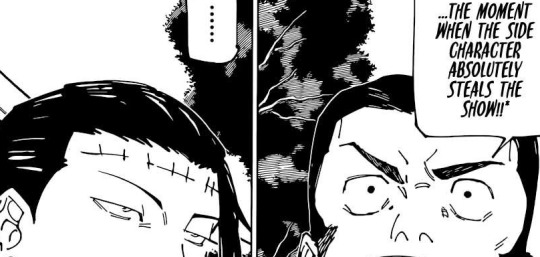
That is the joke that Takaba introduces himself with "Wouldn't it be funny if a random comic relief side character suddenly defeated the big bad?"
He's immediately pointing out a blindspot, because Kenjaku automatically believes himself to be an important character, he underestimates Takaba because he's a side character, one of the people Kenjaku has dismissed as boring and uninteresting (before they even had a chance to evolve into something else). Like that's the other thing Kenjaku wants things to evolve but he doesn't... let them. He abandoned Choso and the rest before they even grew up, they were literally fetuses and he threw them away. Kenjaku is the protagonist of reality, and Takaba is a side character, and therefore Takaba couldn't possibly harm him because Kenjaku and his boundless curiosity are the center of the world.
It's not just about subverting the audience's expectations to have the main villain die in such an anti-climactic way before the final act even starts, but it's pointing out how narrow Kenjaku's viewpoints really were all along. He wants everything to be surprised but he never lets anything surprise him, because either he gets bored right away, or he looks down on others before giving them the chance to evolve, or the third thing he just straight up has to control everything. He can't let the culling game evolve naturally he's going to slaughter all the players by hand so he can move onto the next part.
It's the contradiction between a schemer who needs to control everything and everyone to bring about his intended result and everything needs to be a part of his big plans, to someone who wants to be surprised by others and have things go off the rails. You can't have both of these things at once, Kenjaku cannot have things surprise him if he rigs everything to go his way with his overly elaborate schemes and his tight-fisted control of everyone in the story.
Like, in comparison to Kenjaku the joker just blows things up and sprays people with laughing gas. They're both playing the same game but the joker is having fun and Kenjaku isn't.
Kenjaku wants an unexpected future, but he doesn't care about any of the modern sorcerers and has a bias towards the heiean era that he considers the height and wants to reset things to bring back the heian era. He wants to be surprised but won't give up control.
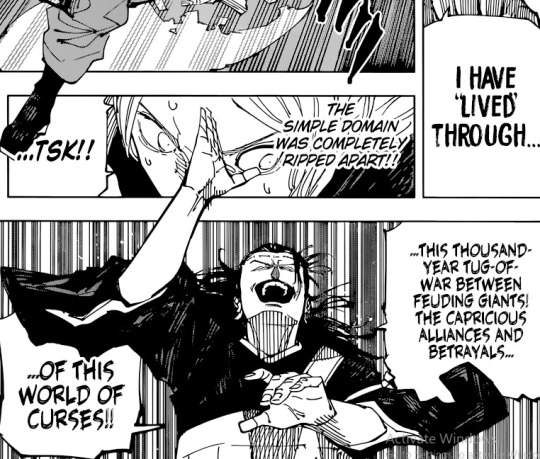
Kenjaku's boast is that unlike Tengen he's spent a thousand years living on the ground instead of lording up on them from above like some deity, but is that true? Has Kenjaku lived? Has he engaged with the world? Formed relationships with people? Or does he just sit in the corner rubbing his hands together menacingly and scheming his schemes.
Takaba unironically gives Kenjaku what he wants, something he's never seen before in a thousand years, and it's from a place Kenjaku never expected. Some random guy, who he dismissed as one of the boring modern sorcerers with no potential like Higuruma.
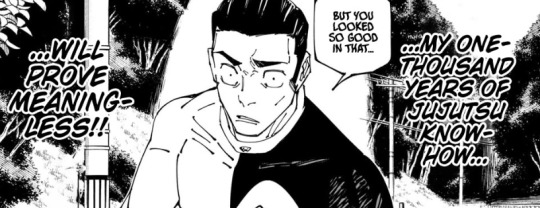
Takaba not only exists in Kenjaku's blindspot, he almost immediately points out Kenjaku's second hypocrisy. If he's willing to resort to mass murder just to feel entertained, then if he found something else to entertain him there'd be no reason to get violent and scheme his schemes.

In other words Kenjaku hasn't really gone looking for other places to try to find what makes life worth living, or at least enertaining, he hasn't really tried any alternatives to finding joy in life because Jujutsu is all he cares about. Takaba says that if he found something else even more entertaining than the merger there'd be no need to go through with the merger, and he turns out to be right. Kenjaku could have found meaning and entertainment with the world someplace else, he was just too narrow minded and never looked anywhere else.
As I said from the beginning Kenjaku's existential crisis comes from his inability to relate to other people and viewing them all as objects, but in Kenjaku's mind of course he can't relate to others they're too boring, so therefore it's the world's fault, and the fault of others and not himself.
However, right away one of those boring people starts relating to Kenjaku.

I joked about how we know nothing about the Gojo clan but Takaba gets an entire backstory chapter about his failed comedy career, but this chapter is plot important because jokes are the way that Takaba relates to and forms relationships with other people. Takaba makes jokes to relate to others but has a fallout with a comedy partner and has never been able to form a lasting relationship with a comedic partner because comedy doesn't mean the same to them as it does to him - because to Takaba comedy is about forming relationships with people. Which is why he thinks he's failed if he's failed to make everyone in the audience laugh because he wants to make comedy that will make other people relate to him and understand him.
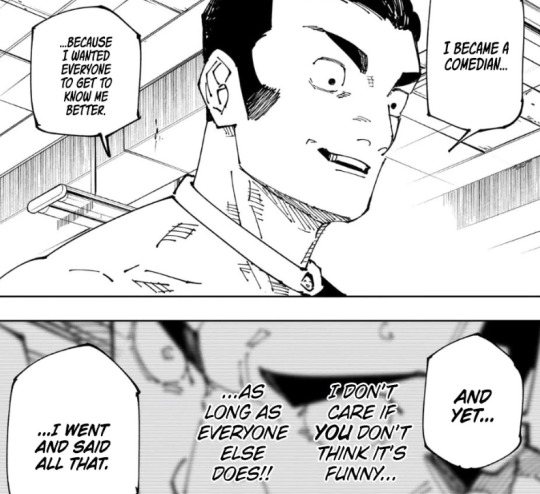
However, he almost gives up on comedy because he's afraid that he might fail on that endeavor. He gives up on striving to make everybody in the audience laugh, because of self-affirmation and a desire to protect himself. He didn't want to fail so he started distancing himself from the audience under the excuse "Well, I can't make everyone laugh so it's okay if not everyone understands me."

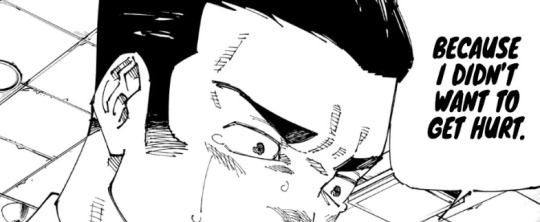
Takaba at some point gave up on trying to use comedy as a means of understanding and relating to others, because of his fear of failure and at that point he nearly lost - but he rallies himself by saying that he won't give up on making someone like Kenjaku laugh. If his comedy is about connecting to others, about understanding others and having others understand him then he can't just give up on Kenjaku and say it's Kenjaku's fault that Kenjaku can't relate to his sense of humor. He's got to try even harder to make Kenjaku laugh.

This is also pretty much the opposite of Kenjaku's point of view. For Kenjaku it's everyone else's fault for being so boring that's why he can't relate to them. Wheras, Takaba takes personal responsibility, he wasn't funny enough, he has to try harder, he's the one who's going to make Kenjaku laugh by improving himself. Takaba looks inward, and Kenjaku looks outwards because there's nothing inside Kenjaku.
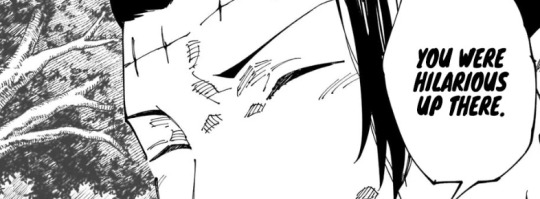
This is a parallel to this.
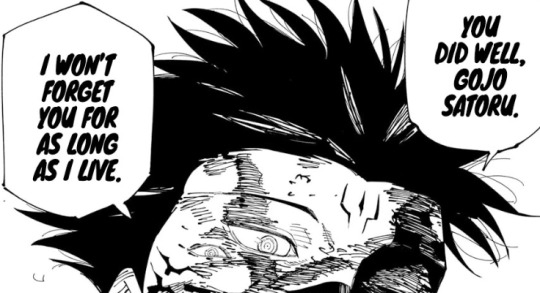
The difference however, is that Sukuna did not betray his ideology. Sukuna lives for the kicks that battle provides him and wants to face strong opponents so he can eventually devoured them and be momentarily entertained.
Like Sukuna is not bored the way Kenjaku is. The world is his playground. He may refer to living as just killing time until you die, but he also says that there's an infinite variety of humans to entertain yourself with. The world is Sukuna's toybox and he's satisfied with just that. In fact he doesn't even care about the merger, until his frustration with Yuji makes him think a little deeper about himself.

Kenjaku is not the Sukuna in this scene, he's the Gojo. He believed he was above others, only to be reminded suddenly that he was just the same as everyone else and brought back down to humanity. I mean, they even die off panel the same anticlimactic way. Gojo's infinity meant nothing in the face of one surprise attack a world-cleaving slash Gojo didn't see coming. All of Kenjaku's backup plans meant nothing in the face of Yuta camping and kill-stealing.


Kenjaku didn't lose because Yuta's plan of camping and killstealing was simply too brilliant for him to prepare for however, we're given the exact reason kenjaku lost - because he was having too much fun with Takaba.
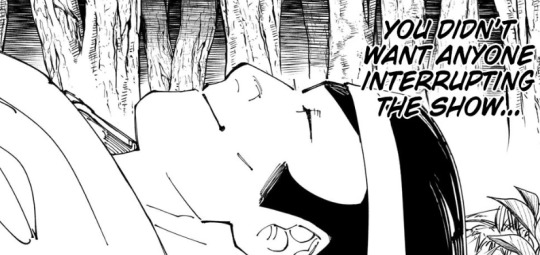
Which meant what Takaba said earlier was true, if Kenjaku found something funnier, something other than the merger that could make him laugh there'd be no need to go through with the merger to begin with.
Kenjaku loses because all along he could have related to people, formed meaningful relationships with others, looked for meaning in life outside of Jujutsu but just chose not to. Which is also a parallel to this.
Sukuna says that Kashimo and Gojo both lost because they were greedy. They already received love in a way, they had the love of everyone who regarded them as the strongest, they had people who earnestly wanted to challenge them and respected them - which Sukuna sees as a form of love, and yet they still wanted more.

They were the ones who put themselves up on that pedestal and decided to stand above all of humanity, they don't get to whine about being lonely on top of that.
To add my interpretation to Sukuna's speech, what he's outlining is a general conflict in Jujutsu Kaisen, you can choose to be all ego to put personal development above everything else but it comes at the cost of not being able to form relationships. Maki's as powerful as Toji now, but the sister she always wanted to protect is dead and basically committed suicide. Meanwhile Noritoshi Kamo didn't participate in the final battle, but he reconnected with his mother and half-brother.
There are plenty of characters who die and suffer in jujutsu kaisen because they chose to value other people above themselves, because Jujutsu Kaisen rewards selfishness and punishes selflessness / having an underdeveloped sense of self.
I'll pick Mechamaru as my biggest example, he lived to protect Miwa, and not only does he die an unsatisfying death, he also breaks her heart.
However, at least Mechamaru experienced love. His desire to protect Miwa is granted, because Miwa is also out of the final conflict. Mechamaru is one of the most miserable characters in the manga, and yet he experienced love in his life for someone else that made his brief life meaningful. The characters who choose love, and other people over strength tend to get stepped on, but they at least had that love in their life to begin with.
It's a having your cake and eating it too situation. Kashimo chose strength over love, and he got to be so strong he was unbeatable and lived to old age, but not only is he unfulfilled but he whines about being unable to relate to the people around him - you're the one who chose to step on everyone like bugs.
Characters in Jujutsu Kaisen don't just experience death when they try to be selfless however, like yeah there's a disproportionate amont of selfless minor characters who die, but like Yuji is the most selfless character in the manga and he's continually punished for it and yet he's the one referred to as a person with an unbreakable will.

Rather instead of Jujutsu Kiasen preferring the selfish side on the scale of selfishness / selflessness, the kind of messy, deaths that get handed out to people like Mechamaru happen when you betray the ideals you were living for. Whether they were selfish or selfless.

It goes back to Toji's internal monologue. You lose when you lose sight of yourself - like there's some deaths that don't fit the mould but for the most part, Gojo, Kashimo, Toji's and then Kenjaku's deaths all follow this pattern. By coincidence they also all take place offscreen for the most part (I suppose we see Yuta cut off Kenjaku's head but it's quick and unsatisfying compared to all the rest).
Kenjaku died because he betrayed what he was living for and he temporarily lost sight of himself. As I said Kenjaku's airtight principles were that everyone was boring and people weren't worth relating too so the only way to find enertainment in life is to cause chaos - but he found himself relating to some nobody he wrote off as a minor character Takaba and having fun with him. Which meant the belief he was false, he could have tried relating to other people all along he just didn't.
He warped his sense of self to reaffirm his identity. Takaba almost did that too, he tried to blame other people for not finding him funny to protect himself, but he moved past that and redoubled his efforts to make Kenjaku laugh.
There's also the added layer of irony that Kenjaku's sudden death brings about, the person who spent a thousand years trying to make the merger happen doesn't get to see it.
However, here's my assertion on why Kenjaku's death before the merger always had to happen.
Because, even if Kenjaku had seen the merger he still would have been bored.
Literally everything about Kenjaku's character and previous actions shows that even if he made his big scheme come true, he would have gone "meh" and moved onto the next scheme because that's how he always reacts.
He got bored of the death painting siblings, he presumably got bored of Yuji, he got bored of all the ancient sorcerers and new sorcerers he made for the culling game, he worked with the disaster curses and got bored of them and dismissed them as inferior primitive curses, he goes out of the way to engineer these chaotic situations and then never feels any satisfaction from them so why would the Merger be any different?
Not only did Kenjaku die before he saw the merger, he was basically doomed to never see the merger, because it would not have fixed whatever is wrong inside of him.
Because it's not the world that's boring, it's Kenjaku himself.
He gets a brief glimpse of what he could have done in life, that he could have tried to forge connections with the people around him and related to them on a personal level - and then he dies the way he lived, in a kind of boring and unsatisfying way.
It's the narrative punishing him in a way, the same way it punished Gojo, and Kashimo, by not letting him see the big explosion after he went to all the trouble rigging the bombs. It's punishing him for the same reason too - by deviating from his true self and showing what he thought were his reasons were shallow all along. Gojo could have always related to people he just chose to stand on his pedestal alone, and Kenjaku could have always found the world to be more enertaining he was the one dismissing other people as boring without giving them a chance to grow.
Takaba confronted his beliefs and then stayed true to his ideology of making everyone, 100% of the people in the crowd laugh. Kenjaku didn't confront his beliefs, he strayed from them because he didn't have the strength of character to evaluate himself the way Takaba did.
Hence, he's finished off by one of those boring people who used their power in a way he never expected. The main villain is defeated by the comic relief character and it's hilarious.
#jjk meta#kenjaku#fumihiko takaba#ryomen sukuna#jujutsu kaisen#jujutsu kaisen theory#jujutsu kaisen analysis#jjk spoiler#jujutsu kaisne spoiler#big spoiler actually
220 notes
·
View notes
Text
You were defeated by your own self , self-loathing,selfeating, Sukuna .- twisted power of love
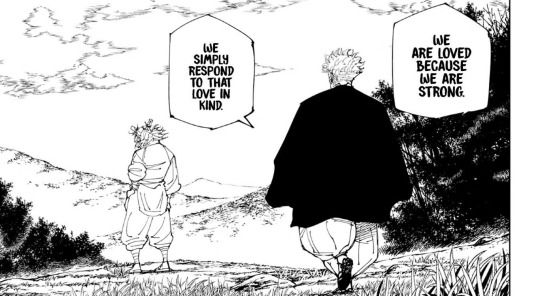
The projection of Gege's self-hatred onto his favorite character.
---The hardest battle you'll ever fight, is against yourself---
TL;DR
And thus, Yuji will strive to separate (Cut like Sukuna) his opponents BUT from their "evil" and direct his energy only towards this "evil," which is the opposite of a Sukuna's self-hatred power ,Yuji can be viewed as a mirror reflecting Sukuna's twisted power of love.
Therefore, the first chapter essentially, by title, reflects Yuuji and Sukuna
Sukuna's statement that "only the strong are loved" ("strong" can be of different kinds)takes on a particular significance: he attracts love through his strength , highlighting his main conflict reflected in his relationship with Yuji. For Yuji, strength and violence are alien; his essence is permeated with kindness. As a result, Sukuna feels his vulnerability, realizing that his achievements hold no value in Yuji's eyes. Experiencing self-hatred, he understands that while Yuji is simply kind to people, his love can be obtained "just like that," whereas towards Sukuna, Yuji harbors disdain, which is painful, as Sukuna has become strong out of a desire to receive love.
"Thus, he became strong because he realized that they loved strength, while he himself was weak. From this, he concluded that by being strong, he would receive love and respect simply for his existence as strong, and he would no longer feel weak. Therefore, his desire for love lost its significance, as only the weak needed it. Now his primary strength became his "love". And this means that using this strength towards himself and others can be compared to its application on the battlefield, where it is used to defeat the enemy. Thus, those who seek love from him will be destroyed, because all he has and who he is, is strength. Without it, he is nothing. "This implies that he cannot be loved because only the strong are loved". Thus, this expresses contempt for weakness, as the weak rely on "love" and connections, while he, being strong, does not need these connections, leading to rejection of both self-love and everything associated with it, and therefore, it is an expression of hatred.
The application of force (hatred) even towards oneself, towards one's weakness - the human side.
Thus, the application of force towards oneself and one's weakness in this context becomes a manifestation of contempt for the human side and dependence on love. This path can be interpreted as an extreme way to achieve self-assurance, which, nevertheless, cuts off from love and leads to hatred towards both oneself and the surrounding world.
The application of force towards oneself and one's weakness here is presented as a way of rejecting love and refusing to accept the human side - thus self-denial-self-eating.
This contradiction is manifested in the irony of the situation: a person becomes strong in his desire to rid himself of his weakness and dependence on love, but as a result, he becomes consumed by hatred, both towards himself and towards the surrounding world.
This desire is expressed through the denial of the human side, the refusal to accept one's weaknesses and dependence on love. This leads to strength becoming the main attribute of personality, while human connections and emotions, such as love, are rejected as unnecessary and even harmful.
Thus, the application of force towards oneself and one's weakness, as well as the denial of love and dependence on it, create a cycle of self-destruction and hatred towards oneself and the surrounding world. This can be interpreted as a path that, although aimed at achieving self-assurance, ultimately leads to isolation and spiritual destruction.
The cycle of samsara.
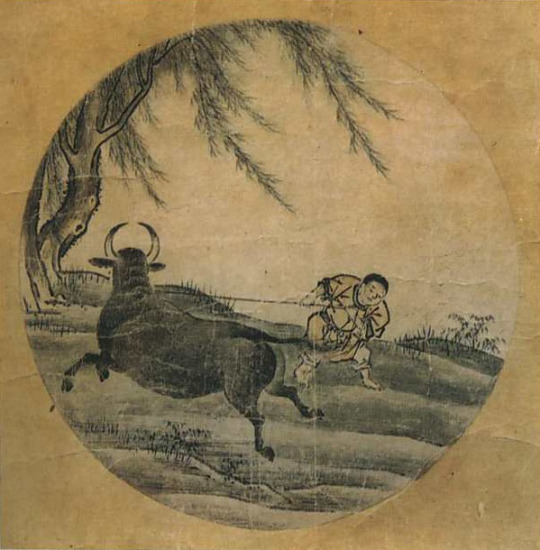
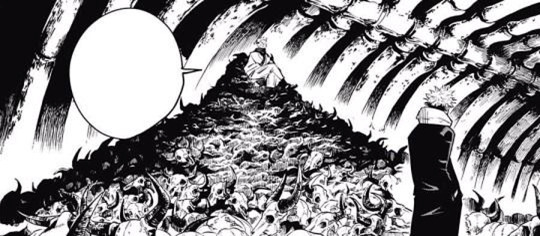
("twisted love ") his curse and power "kitchen"- (10 bulls Buddhism- you can read in wiki ) - he literally kills (eats) the “bull” "human" his own self constantly, so there are a lot of their skulls inside him - his own , and he sits on the throne of them, his essences, believing that he has “surpassed” himself - the human nature
"Sukuna is surrounded by the remnants of his failed attempts to transcend his ego, symbolized by the "skulls" of his former selves."
maybe this is part of the “vow” of constantly fighting (eating) within yourself
Self hatred
Like the seals on his shoulders - circles
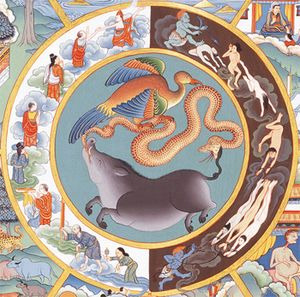
Sukuna is the strongest because he suffers the most, hates himself and experiences an internal conflict that generates cursed energy.
Anger (rage, aggression, a sense of vengeance, disgust) is represented in the image of a snake. The snake typically slithers away when approached by a human or attacks them. Similarly, a person seeks to eliminate an irritating object from their field of perception, either by avoiding it or destroying it. This is similar to his behavior and avoidance of Yuji - the epitome of absolution - kindness, because he unconsciously experiences disgust – the truth.
The Rooster is a symbol of passion, as it is both the owner of a harem and capable of finding a tiny grain in the grass and dust – exactly what it needs; just as passion keenly selects its object of desire from the multitude presented. This can be compared to how Sukuna chooses his opponents.
Ignorance (neglect, stupidity, laziness, foolishness) is represented in the image of a pig. The pig eats everything indiscriminately, unable to discern between good and bad, fortunate and unfortunate due to its lack of understanding. Incidentally, the pig is the only animal unable to lift its head to the sun. However, Sukuna usually regards others disdainfully from top to bottom, like a large pig, experiencing "foolishness" because he has confined himself within the pigsty of his own convictions.

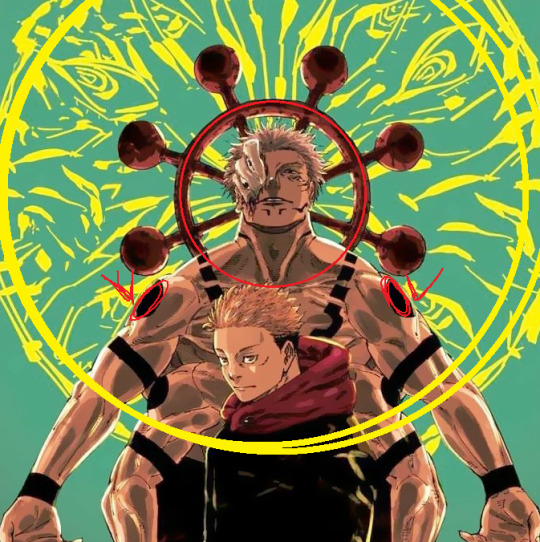
Perhaps not intentionally, but symbolically, Yuji's head is at the level of his heart.
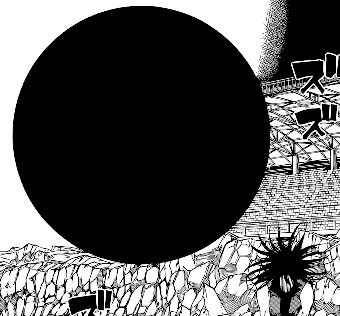
In other words, the cursed energy spawns a concentration circle of hatred , trapping individuals in an endless cycle of conflict,a cycle of samsara- in which people remain fighting with another person with their emotions. - mostly hatred
This could be seen as a vow or a struggle to overcome one's own limitations , by constantly confronting and consuming aspects of the self.

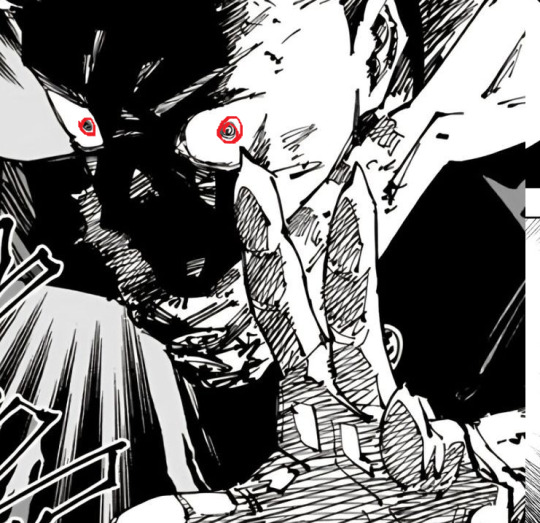

"You weren't merely defeated by external forces, but by your own internal strife—your perpetual disdain for your human side."
your downfall stemmed from your own internal contradictions, which morphed into a binding oath (all his seals on his body literally seal a person in him). Your disdain for humanity, extending even to yourself, became both your strength and your curse, corroding your soul from within (gestures toward the mask).
(the mask) Much like Tengen, embodies a constructive "emptiness" that exists harmoniously with the world, at peace with people. However, Sukuna's "emptiness" is purely literal, representing a detachment from humanity, a void of sorts.
You've lost all sense of purpose, consumed by self-loathing to the point of utter emptiness.
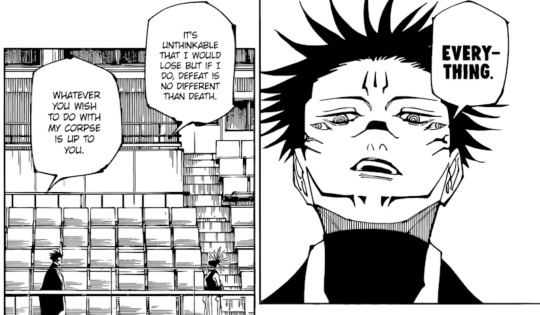
he is his strength - and if he loses, he "strength "will die, which means to him that he is nothing(because "I" = strength ),( which everything) he can feel , towards "him " is hate, emptiness ,insignificance - nothing - cant take "love".
nothing is nothing - so it his - corpse
paradoxically there cannot be “love”, because only the “strong” are loved.
It's as if he can't even comprehend the idea of being loved or valued without his strength.
Without it, he feel like a mere shell of himself, devoid of purpose or meaning. - corpse
his "manhtra "
His strength defines him, and should he lose it, his very essence will wither away, leaving him feeling like nothing.-(which everything to him.) Because in his eyes, strength equals identity, and without it, he is left hollow, consumed by feelings of worthlessness and self-loathing.
To him, strength is everything, and without it, he feels empty and insignificant. He's trapped in a mindset where only the strong are valued or capable of receiving love, leaving him unable to grasp the concept of being cherished for anything other than his strength. Without this defining trait, he fears becoming a mere shadow of himself, devoid of purpose and meaning—a walking corpse. His mantra revolves around the idea that his strength is synonymous with his identity; losing it would strip away everything that makes him who he is, leaving behind only a hollow shell consumed by feelings of worthlessness and self-doubt.
This fear of worthlessness drives him to cling desperately to his strength, as he sees it as the only thing protecting him from a profound sense of misery and insignificance. It's not so much a fear of death that motivates him, but a fear of experiencing the emptiness and smallness he associates with weakness.
So when he talks to Yuji he projects
You are my special
"Get lost in me" - "Become me."
I wanna feel your heatwave - Break down.
I love you, baby - I hate you
because you don't yield to me, to my strength
A world spinning in ambiguity - on the other hand, if Yuji does not give in, then Sukuna loses his “power” - himself and his hatred,"And will make him feel (1 )'loven'."- (This means that Yuji literally robs him of his purpose - his strength - himself - his self-loathing.)
(1 )This suggests that Sukuna's identity is closely tied to his ability to dominate others, especially Yuji. If Yuji resists, Sukuna not only loses his power and sense of self but also his profound self-hatred, leaving him vulnerable to experiencing an unfamiliar emotion—love. In essence, losing control and self-hatred allows Sukuna to explore a more vulnerable side of himself.
You are my special
"Even if the meaning is not correct, the fact is that they mirror to each other."
He wants to prove that his own existence and self-hatred are justified.
Sukuna conducts " a series of trials " before Yuji, aiming to prove to him that his purity of soul is not the basis of his strength. He expresses the belief that the source of strength lies in the ability to be cruel and hateful rather than kind. In his worldview, strength arises from self-loathing and denial, while love and compassion are seen as manifestations of weakness.
Sukuna seeks to affirm his beliefs through these trials and sufferings. He desires to break Yuji, to bring him down to his own level of hatred, in order to confirm his own existence and self-hatred. For him, pure strength becomes a symbol of his self-loathing - his own "self." He seeks to reinforce this hatred through Yuji, who, in his opinion, is excessively pure and capable of loving others unconditionally, which, in his view, renders his strength useless and undermines his own existence.
Overall, Sukuna's character is driven by a complex interplay of fear and a desperate need for validation through the lens of strength and self-loathing.
SURVIVAL
"You're so weak yet you cling to life?"
CHILD "I"- lack of strength" - weak and misery- unwanted , rejected, unloved, insignificant, unimportant, nothing, profound sense of emptiness and smallness.- DEATH
"You should spend your lives stifling (EATING)your misery. "
(Sukuna -Child - Yuji)

It seems to me that here it is being said that a brother or another close person can replace a parent in terms of providing love and understanding "self", as well as becoming a reliable support for the individual.
Perhaps previously he believed that self-love was meaningless (although he assumed this applied to others as well), but after encountering Yugi's soul, he realized that love, akin to dedication to an ideal, gains significance as it can transcend death and become something eternal, which is the true meaning. This enlightenment proved more significant than Sukuna's physical prowess, piercing his self-perception for the first time and shaking him to the core.
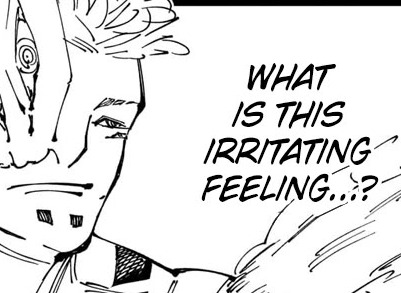
As the only thing he had been doing was killing time to die.
From the expression on his face in these two frames, there is a similarity: when it comes to love, he appears irritated, but this time he felt it - the love - and experienced pain, for the first time in a long while.

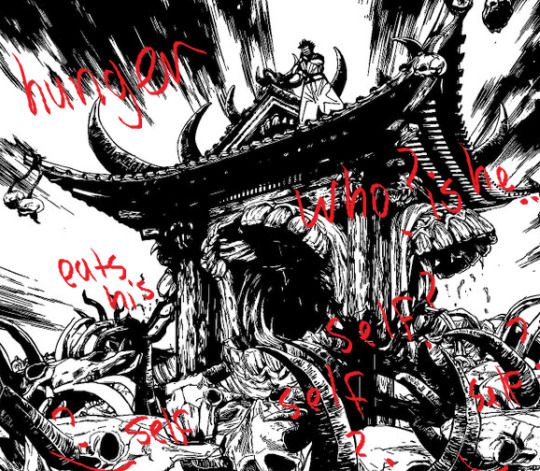
Sukuna, as the most powerful being, has moved away from the notion that his strength guarantees victory. Now it's more of a shadow of an ideal—meaning himself as well, because Sukuna possesses only power—a symbol of relentless personal resilience that he finds in Yuji. He has realized that without this strength, he is devoid of purpose, and in his pursuit of it, he has lost everything, including himself and his inner content. While in Yuji, lacking this power, his eyes shine like a beacon of humanity the love he needed—an ideal that transcends himself, through the idea of protecting others, akin to Prometheus his kindness. This irritates Sukuna and casts doubt on his own existence.
The deal is that Sukuna, regarded as the "strongest " was bored and annoyed with Yuji because his strength was based on something Sukuna could never understand or accept—the true essence of love.
Love, as a force and a tool, is immeasurable except through the sacrifice of those who gave their lives for the ideals of higher humanity—those whom Sukuna could not understand and whom he killed in his pursuit of "strength" and acts of violence deemed "supreme" beyond human nature.
Only after meeting Yuji did Sukuna gain insight, and his transformation can be characterized as a (2 )manifestation of love. Because he begins to "understand" other aspects of human existence, such as compassion, selflessness, and the ideals of higher humanity. In this context, his insight and change are perceived as manifestations of (2 ) love—understanding and accepting these human qualities that he previously could not comprehend or acknowledge.
The (1 ) first follows from the (2) second, but Sukuna hasn't understood it yet, he has only feel it.
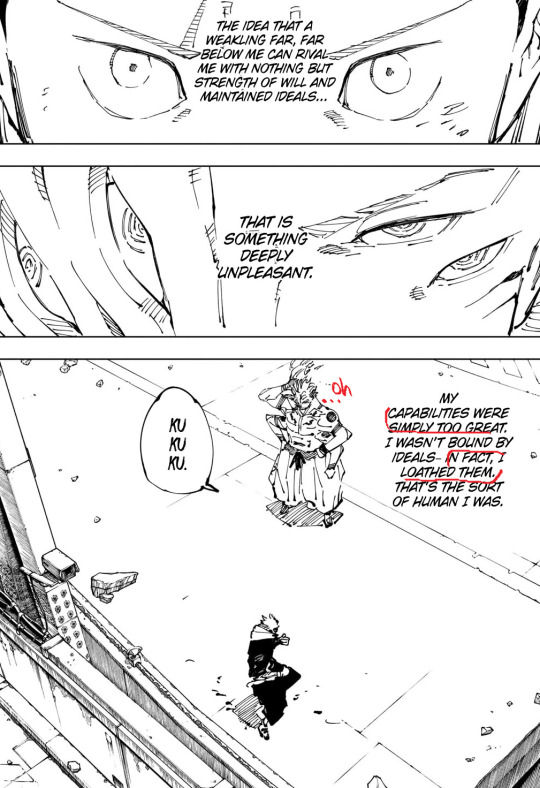
Sukuna has long lost the battle against his own hatred, mired in feelings of anger and jealousy. These emotions only fill him with disappointment and rage, fueling his desire to seek ways to cause pain and damage solely to destroy Yuji and undermine his faith
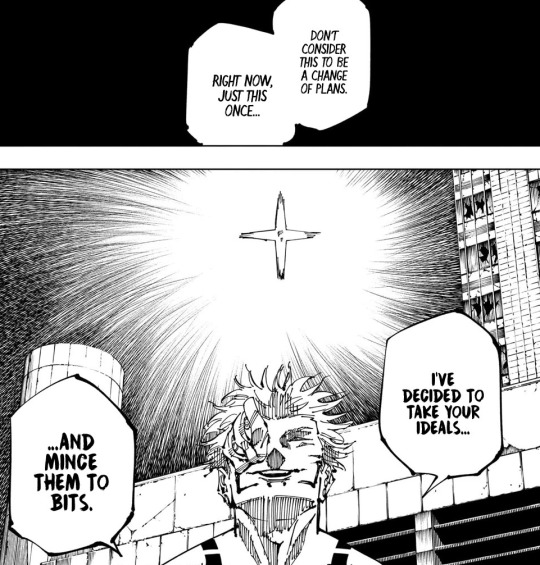
The acknowledgment that his kindness - love is genuine and unconditional seems incomprehensible to him, as if he's afraid to admit that such a thing is possible - because he was not loved and had no one. and that means he didn’t need anyone to satisfy him


Short version
He remembers his yearning for love during childhood, seeing it as a symbol of vulnerability and lack of significance. Regarding dependence on someone "stronger" as a weakness, he holds the belief that seeking affection and connections is characteristic only of the weak.
As a child, Sukuna often felt vulnerable due to his weaknesses, which made him feel chained to his flaws. This prevented him from truly loving himself and others, and he believed that only the strong deserved love, attention, and respect. Sukuna realized that true strength lies not in seeking love, but in giving it to others. However, he saw this gesture as a weakness and chose to demonstrate his strength through hatred instead of love. In battles, he "gave" his "strength " - "love "to others as a form of victory, judging the weak (including himself) as deserving of destruction. Sukuna rejected the concept of love as a dependency for the weak and meaningless for the strong. He avoids using names because he sees his past (weak) self in others, particularly Yuji, and despises himself for it.
In the past, Sukuna often felt vulnerable because of his weaknesses. It created the impression that he was shackled by a chain linking him to his flaws. This hindered him from truly "loving" himself and others, experiencing compassion ..? huh. He believed that only the strong deserved love, attention, and respect, and without strength, he was nothing.

That's why Sukuna realized that true strength lies not in the pursuit of love, but in being able to "give" it to others. He concluded that such a gesture is something only the weak need. Therefore, he decided to resort to another way of demonstrating his "strength"—using it as a tool of hatred instead of love.

Here, he seems to be contemplating a reflection that doesn't actually exist, only its silhouette - in the present, or, to be more precise, he sees himself in Yuji - in the past.
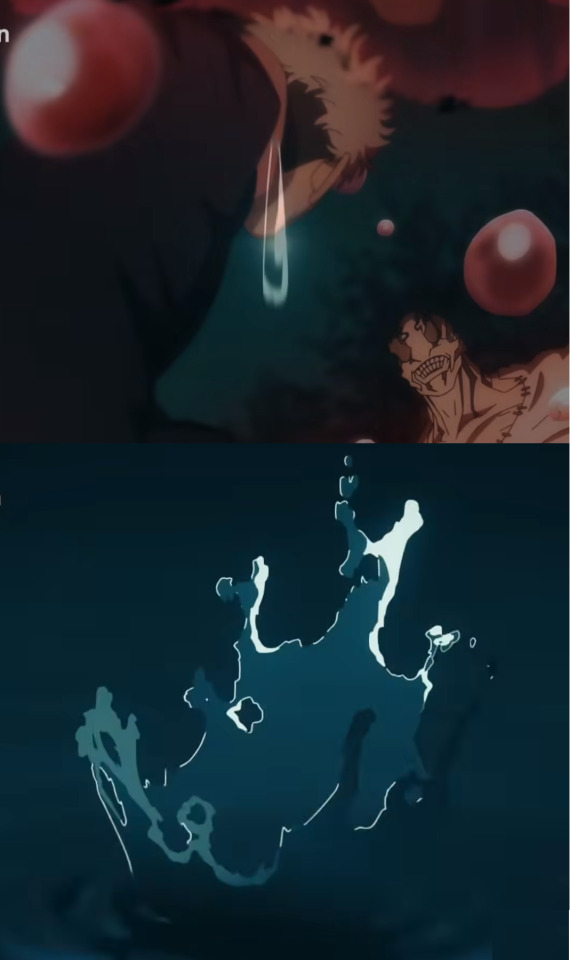
I wonder that this drop falls in Sukuna's domain, isn't it?

Sukuna began "giving" his "strength" to others in battles, seeing it as his version of "love"—an act of victory, where he acts as the judge of the battle, where the weak (Sukuna)are destroyed. And he decided to abandon the concept of love, considering it a dependency meant only for the weak and meaningless (now he's above "love" ,he is not a child, a parallel with Yuji and his treatment of him is disdainful-he recognizes himself in him)for the strong.
So he refrains from using his name because he sees himself (specifically, his past self as a child) in him - and despises himself.
Sukuna regarded strength as the sole indicator of success, and it became his driving force, but, like fuel, it only fed his inner hunger, the desire for self-destruction, rather than self?-love. He replaced strength with a sense of his former insignificance. Even being the most powerful, he couldn't stop and didn't find satisfaction, destroying himself, killing his "self" in the process, which ultimately led him to emptiness. - But the fact is that this emptiness is not of a Buddhist nature, not grounding, but self-eating
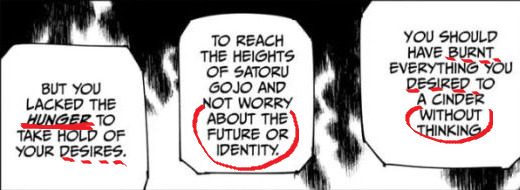

In the depths of Yuji, there is something that I am sure will turn out to be his hidden power : the ability to transform internal negative emotions into a manifestation of faith in goodness. He will not just suppress these emotions but actively engage in a struggle with them. Yuji uses hatred as a sort of weapon against hatred itself—like fighting fire with fire. He will begin to see "more than he" the idea of hatred as an inner enemy present in each of us, reflected in his own personality, in Sukuna, and in the personalities of those around him.
And thus, Yuji will strive to separate (Cut like Sukuna) his opponents from their "evil" and direct his energy only towards this "evil," which is the opposite of a Sukuna's self-hatred power ,Yuji can be viewed as a mirror reflecting Sukuna's twisted power of love.
Speculation below
The absence of parental love can create a profound void in childhood, leading to a deficiency in emotional support which, in turn, contributes to negative self-perception and attitudes toward oneself and the world. This deficiency often manifests as low self-esteem, self-hatred, and behavioral issues such as aggression or depression. Jacques Lacan's concept of the "mirror" provides insight into how parental relationships sculpt a child's self-perception and psychological development.
It is intriguing to observe how Yuji and Sukuna mirror each other's behaviors.
Identification and emulation: Individuals who lack parental figures may seek to emulate others who resonate with them or serve as role models. This behavior often stems from a desire to comprehend how to appear, feel, and act based on observed traits in others.
Search for emotional connection: People who lacked parental figures or did not receive adequate emotional connection during childhood often strive for intimate relationships with individuals who can fulfill this emotional void.
It's worth noting that characters may not fit perfectly into any one personality type due to their complexity and fantastical nature.
Yuji's identity is deeply intertwined with television. Gege's narrative underscores that he "grew up on television," suggesting that this medium became a surrogate for parental figures and filled the emotional void in his life. His enthusiasm for parodies and karaoke, venues where he could interact with others, reflects his ambiguous sense of individuality, likely influenced by television as his primary source of inspiration and behavioral model. Additionally, his emotionally reserved grandfather deprived him of necessary support during childhood. - if unfounded then Yuji INFJ -INFJs are known as chameleons, adapting to different situations. This clarifies why Yuuji excels in collaborative combat and absorbs lessons from others—he's like a sponge.
Sukuna's depiction as a petulant child reflects emotional immaturity and egocentrism commonly associated with unresolved childhood traumas or deficiencies in parental nurturing. His reactions and demeanor echo characteristics typical of children: egocentrism, emotional volatility, rebellion, and disobedience. His unpredictable behavior mirrors the emotional turbulence of a child grappling with feelings of abandonment or neglect, particularly evident in situations beyond his control or comprehension. - if unfounded then Sukuna INTJ
INFJ : "I may not always understand the intricacies of your emotions on an intellectual level, but I can feel them deeply.It might not intrigue you cold mind , but it brings warmth to your heart." Breathing life into your being."

INTJ: "Your natural stands as an enigma within my ordered world. Yet, I find myself drawn to this anomaly, stirring within me something beyond rational comprehension. This connection, however unconventional, holds a fascination that I cannot ignore."
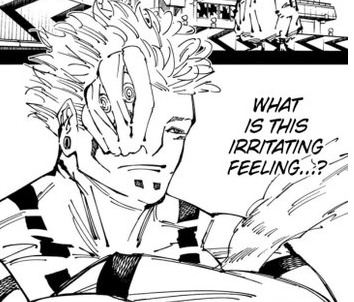
One feels the other thinks - but they are one -connection between Yuji and Sukuna, suggesting that despite their apparent differences, there is a symbiotic relationship between them. This mean that they influence each other in profound ways, with Yuji's emotional sensitivity complementing Sukuna's strategic thinking, or vice versa. It indicates that their identities are intertwined on a fundamental level, even though they may manifest differently in terms of behavior and personality.
Nevertheless, Sukuna experiences a transformative moment when he acknowledges and embraces the profound love emanating from Yuji. This revelation serves as a form of "enlightenment" or "rebirth," illuminating a path within the darkness of his existence. This is the first time Sukuna encounters unconditional love. For him, it signifies liberation from hidden motives, such as the desire to use others in his childish power games ("me versus you," "who's superior," etc.), simply to kill time. Now, he avoids manipulations he once considered normal but which Yuji interprets as a craving for attention. Yuji doesn't value "power," leading Sukuna to the paradoxical conclusion that he's unloved - the only thing he ever desired. He realizes his past actions were merely theatrics, where he played the leading role, but now, meeting Yuji, everything changes. Yuji doesn't engage in this game, refusing to succumb to the spectacle of death for emptiness' sake. This moment underscores parental resilience, selfless guidance, and dedication to the greater good.
This realization is especially poignant following Sukuna's unsuccessful attempts to break Yuji. Yuji's unwavering loyalty and resilience, directed not towards himself, exemplify a depth of love Sukuna has never encountered. Sukuna's inability to avert his gaze from Yuji, despite the accompanying anguish, underscores his inner turmoil. This revelation challenges his preconceived notions, exposes internal conflicts, and highlights emotional vacancy, reflecting the difficulty he faces in embracing newfound emotions and comprehending the true essence of love and loyalty.
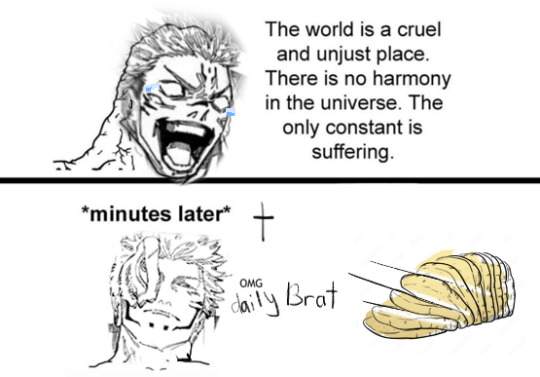
#jjk meta#ryomen sukuna#jujutsu kaisen#jujutsu kaisen theory#jujutsu kaisen analysis#jjk#jujutsu kaisne spoiler#yuji itadori#jjk manga#manga#anime#jjk spoiler#jjk analysis#jjk 255#jjk 256#sukuita
118 notes
·
View notes
Text
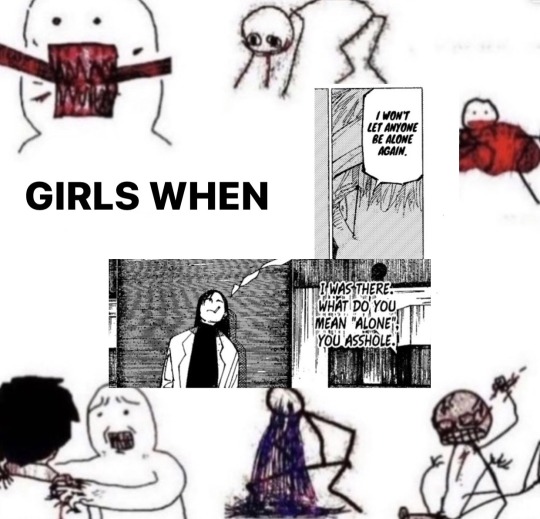
#IM STILL GOING INSANE OVER IT#SHOKO MYBELOVED#GOJO MY BELOVED#EVERYONE PLEASE GO TO THERAPY FOR FUCKS SAKE#jjk#jujutsu kaisen#jjk spoiler#jujutsu kaisen spoiler#jjk 220#kisekidump
780 notes
·
View notes
Text
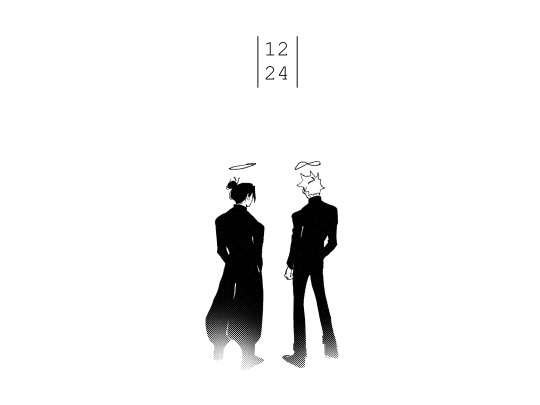
Happy holidays! ! ! -cries-
267 notes
·
View notes
Text
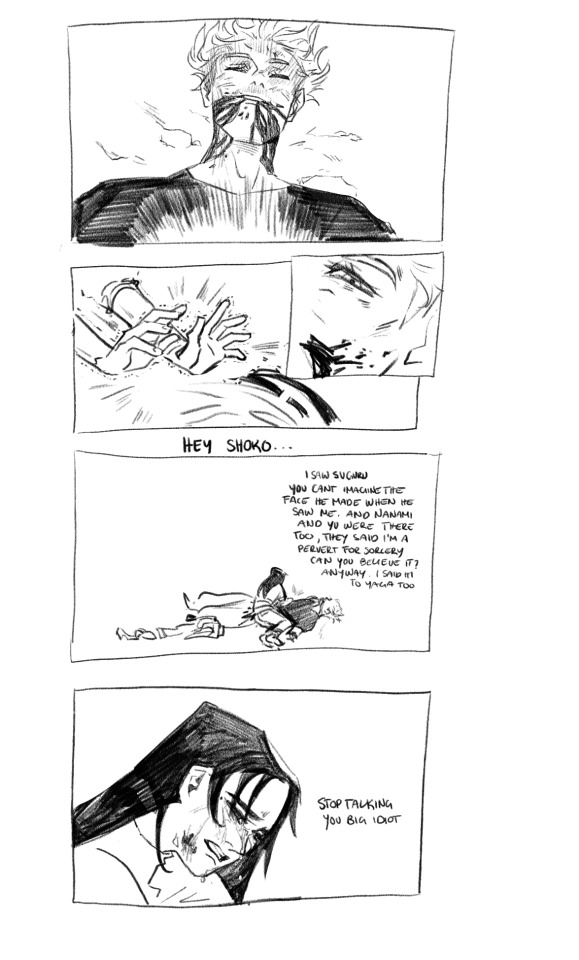
I fixed it
#jjk spoiler#jjk leaks#shoko ieiri#fanart#gege she literarely has suffered enough#are you fucking kidding me?#like the seat between suguru and satoru is literarely EMPTY#thats where she would be sitting#also whats up with the name drop? I NEED ANSWERS#gojo satoru#IPMSSA_SatoSho!Fanart#IPMSSA_Panels#IPMSSA_canon!Fixit
1K notes
·
View notes
Text
desperately trying to ignore the way Nanami looked like he was going to cry while he beat the shit out of Haruta. He was furious, yes, but he was also fresh off a serious trigger for his ptsd with Haibara, and he sees Nobara get hit and fall. I know his heart was hammering. he must have been so worried and upset, and I wish he could have taken a moment to process before throwing himself back in.
#nanami kento#haruta shigemo#nobara kugisaki#jjk#jujutsu kaisen#jjk text#jjk headcanons#jujutsu kaisen headcanons#jujutsu kaisen hcs#jujutsu kaisen text#jujutsu kaisen headcanon#jjk spoilers#jujutsu kaisen spoilers#jjk spoiler#jujutsu kaisen spoiler#i want him to put his head in my lap and i want to keep him safe#he didnt deserve any of this
137 notes
·
View notes
Text



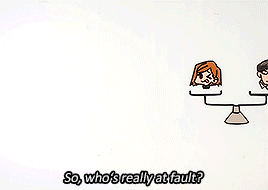
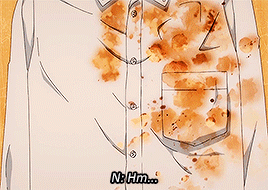
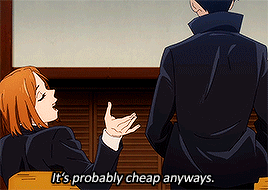
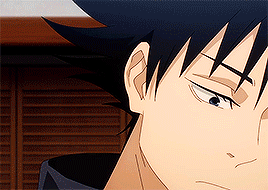
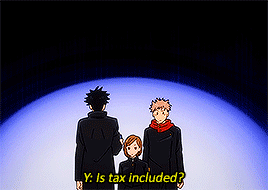


Bonus:
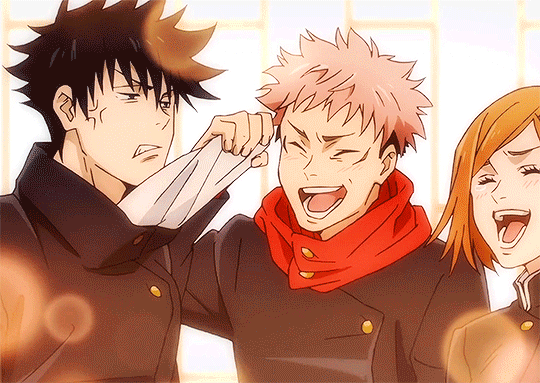
#ipost#Jujutsu Kaisen#JJK#Spoiler Warning#Jujutsu Kaisen Spoiler#JJK Spoiler#Jujutsu Kaisen Season 2#JJK Season 2#Episode 20#Right and Wrong Part 3#Shibuya Incident Arc#Chapter 126#Chapter 127#Chapter 128#Gege Akutami#Mappa#GEGE WHEN I CATCH YOU GEGE#Kugisaki Nobara#Kugisaki#Nobara#Asami Seto#Itadori Yuji#Itadori#Yuji#Junya Enoki#Fushiguro Megumi#Fushiguro#Megumi#Yuuma Uchida#Gojo Satoru
169 notes
·
View notes
Text

now we are one, let me love you
↳ g. satoru x g. suguru, g. satoru x reader ♡ angst, fluff
↳ tw: death, mention of a afterlife ♡ self-indulgent (I'm still trying to cope)

just thinking about the moment Satoru releases his final breath as his soul lets go. he can finally be at peace because he knows he's about to see you and suguru soon. he can't say that he hasn't braced himself for this moment because he has. it makes him wonder what his afterlife will be like.
will you be waiting? will it be suguru? maybe both?
regardless, he's going to make up for lost time. hold you like he's afraid he's going to lose you again. kiss you like he's missed you because he has. so fucking much. the last thought on his mind causing a smile to gradually grow as a single tear falls from his eyes.
he's going to be able to be happy again.
no sorcery, no saving others, no more loneliness. no more sleepless nights, no more nightmares.
you have more time to be able to be together.
he's always regretted the way things ended with you and how he wasn't able to save suguru from spiraling into madness. hated how he wasn't able to protect you from your untimely demise after your breakup. how his last words to suguru weren't what he truly wanted them to be.
how he wasn't able to protect the both of you from yourselves.
after losing both of you he vowed to never love again because he knew he would never feel the same way he felt for the two of you, for anyone else.
"welcome home, Satoru.”
satoru blinks, his heart doing leaps and bounds as he stands in front of the two people he fell in love with at different points in his life. his bottom lip wobbles the second he takes in your warm smile that makes your eyes crease, arms wide open for him to run into. he had hoped he would be able to see the both of you but he didn't expect the both of you to be waiting for him together. he was sure he would have to search for at least one of you but he's glad. it makes him happier to know that, even in death, you both are willing to stick by his side.
willing to be with him.
willing to still love him.
"I'm so sorry."
"It's not your fault, satoru." Your voice is gentle but firm, knowing (and hating) that he blamed himself for your death. Honestly, You had no business going on missions when your head and heart weren't in the right place. Losing your best friend, Kento, during the Shibuya incident had you spiraling but also, feeling like you were losing your grip on your life and relationship was the nail in the coffin. Your breakup took a harder toll on you mentally and everyone could see it. Yaga tried to stop you but you were too hard-headed to listen to reason. Even the higher-ups knew all of this and they still sent you to your death. If anyone was to blame, it would be them.
satoru remembers seeing your lifeless body on the table like countless others, only breaking away when shoko finally covered your corpse. feeling the curse of loving someone all over again. he went through with suguru and now you were an added casualty. you weren't supposed to be there and Satoru felt if you hadn't agreed to end things, you would have still been alive.
"You can't blame yourself for our mistakes. I chose my path, satoru." suguru says, placing a soft kiss on top of his forehead with a softer smile before pulling away. "I can't change what I've done but I've accepted it."
his mind reels remembering how he was forced to end suguru's reign of terror.
"I forgive you. You were doing what was right." the tears streamed down satoru's face as he listened to the both of you. his heart breaking for the third time as he releases a sob, feeling the way you're reaching up to rub the back of his undercut. he relaxes as much as he can but you know it's going to take some time for him to truly be okay.
"I've missed you both so much."
"Well, now we have all the time in the world," You chuckle, letting satoru step away to try to get his bearings.
"an eternity to make things right."
you both hold out your hands as he takes one of yours and one of suguru's. the tranquility washes over him in waves because he can't believe this is his afterlife, this is his serendipity. surrounded by snowfall and sweet flowers blooming around you as you lead him to his safe space.
his haven.

© GOJOLATTE 2024 ➳ ALL RIGHTS RESERVED
PLEASE DO NOT Copy, Translate, Re-Upload, or Steal ANY of my work.
Thank You, Beautiful People!

#gojo satoru x reader#gojo saturo#geto suguru x gojo satoru#jjk x reader#jujutsu kaisen#satoru x reader#satoru x suguru#satoru x you#jjk satoru#jjk#gojo satoru#gojo x reader#gojo x you#satoru gojo x reader#gojo satoru x you#jjk m#jjk men x you#jjk spoiler#angst#fluff#one shot#gojolatte#fuck gege
136 notes
·
View notes
Text
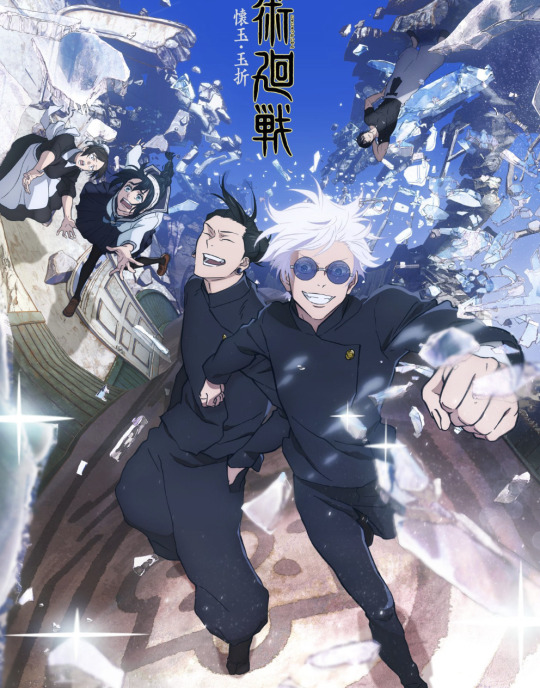
it’s rly the way everyone in this picture is dead
#i know it was never made clear but i’m 99.9999% sure misato is also dead dnchskhdsk#cattoru's#jjk spoilers#jjk manga spoilers#jujutsu kaisen spoilers#jujutsu kaisen manga spoilers#jjk spoiler#jujutsu kaisen spoiler#jjk manga spoiler#jujutsu kaisen manga spoiler#jjk
311 notes
·
View notes